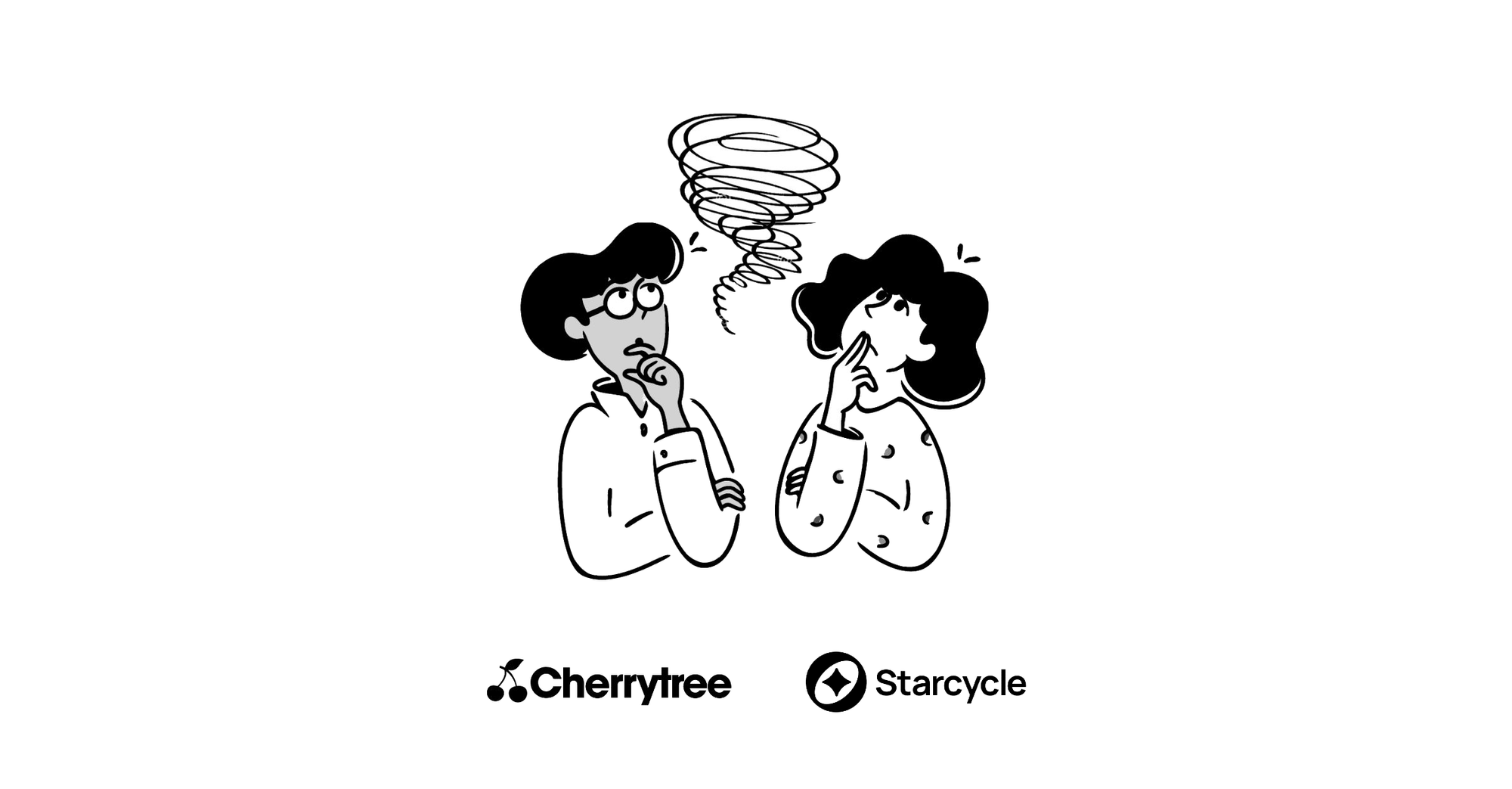Most Startups Don’t Fail—Their Cofounderships Do
Most startups die before they even have a chance, and bad cofounder dynamics are the #1 silent killer.

At Starcycle, we have the privilege of meeting, and working with, repeat founders who understand first-hand the highs and lows of the entrepreneurial journey. We invite them to share their stories and the hard-earned lessons they've gathered along the way with the founder community at large.
Tim He studies cofounderships and shares his findings at Cherrytree so you can learn how to become the cofounder your startup deserves.
Your startup isn’t going to fail because of a bad market.
Or a lack of funding.
Or because your competitors had better connections.
Your startup is going to fail because you picked the wrong cofounder.
Most startups die before they even have a chance, and bad cofounder dynamics are the #1 silent killer. No one talks about it enough because, by the time things blow up, everyone’s already moved on—one founder quietly updates their LinkedIn, the other starts another company, and no one writes the real post-mortem:
“We had a great idea, but we just weren’t the right team.”
Let’s make sure that’s not you.
Signs You Picked the Wrong Cofounder
If you recognize any of these, you’re already in trouble.
1. Bad vibes.
Yes, actual bad vibes. You’re ignoring the little red flags because you’re desperate to get started. But trust me—your gut is trying to save your startup before you even incorporate. Listen to it.
2. You think picking a cofounder is like picking a seat at a concert.
You show up, take what’s left, and hope for the best. Found a coder in a Discord? Roommate wants in? Congrats, you now have a cofounder—but no idea if you actually work well together.
3. You assume shared passion = success.
You both love the idea. You both believe in it. That’s cute. Now tell me: Who’s willing to grind when it gets ugly? Who still shows up when funding dries up? Because that’s what actually matters.
4. You think “compatibility” means agreeing on the logo.
Alignment isn’t about colors or fonts. It’s about how much risk you’re willing to take. How hard you’re willing to grind. How you handle stress, failure, and conflict.
If you don’t know where your cofounder stands on those, you don’t know them at all.
5. You expect them to work 80-hour weeks “for now” on a hope and a dream.
If you wouldn’t quit your job and work full-time on an unpaid internship, why should they? Startups are a multi-year, all-consuming commitment. If you’re offering pennies and empty promises, expect them to bounce.
6. You think passion alone will carry you.
Passion doesn’t pay rent. Passion doesn’t cover legal fees. Passion won’t convince an investor that you know what you’re doing.
And being LinkedIn famous sure as hell doesn’t, either.
7. You haven’t considered what it actually means for your cofounder to quit their Google job.
A lot of you are out here expecting a software engineer making $400K+ at Google to walk away for 10% equity and vibes. Do you even realize what you’re asking?
If your startup flops, they don’t get that Google job back. They lose years of career progression. Maybe their visa status. Maybe their ability to pay their mortgage.
Make sure you’re clear on the trade-offs before asking someone to take that leap.
8. You have no clue what “MVP” actually means.
If your definition of MVP is “an app that looks like Instagram, but for [insert niche],” you don’t need a cofounder—you need a reality check.
If you’re asking someone to “just build it,” but you can’t even articulate how long it’ll take, how it’ll get to market, or what actually makes it viable—you’re the red flag.
9. You think talking about money, roles, and the future is something you can “figure out later.”
If you can’t talk about money now, wait until things are actually worth something. That’s when founders turn into enemies.
You don’t “figure it out later.” You define it now—before the lawyers and lawsuits get involved.
10. You never even asked your cofounder why they actually want to do this.
Did they just need someone to code for them for free? Did they think a startup would look cool on their resume? Are they in it until the first big hurdle?
Because if you never had the conversation, you’re setting yourself up to find out the hard way.
Give Your Startup a Fighting Chance
Startups aren’t fragile. Cofounderships are.
Your biggest risk isn’t the market, competition, or funding. It’s the person sitting across from you at the kitchen table, calling themselves your cofounder.
Want to avoid this fate? Check out Cherrytree’s Cofounder Compatibility Calculator—so you don’t waste years of your life in a doomed partnership.
But what if you’re already in a cofounder relationship that isn’t working? Not every partnership is meant to last—and that’s okay. If you’ve reached a point where moving forward together isn’t an option, Starcycle helps founders navigate what comes next, with clarity and integrity.
Most founders don’t want to think about what happens if things go south. But if you don’t take your cofoundership seriously, you’ll find out faster than you think.
Don’t let a bad cofounder be the reason your startup’s story ends before it even begins.
Disclaimer:
The views and opinions expressed herein are the views and opinions of the author and do not necessarily reflect those of Starcycle, Inc., nor does contributing as an author establish or imply a client relationship with Starcycle, Inc.

